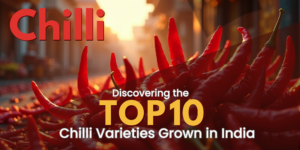
India is often called the spice capital of the world, and when it comes to red chillies, the country enjoys a reputation like no other. From fiery ghost peppers of the Northeast to the vibrant Kashmiri chillies of the North, each variety reflects the diversity of Indian soil, climate, and culinary tradition.
At I Kar Exports, we proudly supply premium quality whole dry red chillies, chilli flakes, and chilli powder to global markets such as Senegal, Georgia, UK, and Malaysia. For exporters, importers, and culinary enthusiasts alike, understanding the major chilli varieties of India is essential.
Here’s a complete guide to the top 10 red chilli varieties grown in India, their flavor profiles, and common uses.
1. Guntur Chilli (Andhra Pradesh)
Heat Level: 30,000–40,000 SHU
Famous For: Fiery pungency, tangy taste, deep red color
Uses: Andhra cuisine, chilli powder, international exports
Guntur district is the largest hub for dry red chilli exports in India, contributing almost 30% to India’s chilli shipments. At I Kar Exports, our Guntur chilli is carefully graded and packed to retain maximum flavor.
2. Byadgi Chilli (Karnataka)
Heat Level: 8,000–15,000 SHU
Famous For: Wrinkled skin, deep red color, mild pungency
Uses: Spice blends, masalas, sambar powder, cosmetics
Byadgi is prized not just for food but also for oleoresin extraction, widely used in the cosmetic and food coloring industry. Its brilliant red hue makes dishes visually appealing without overwhelming heat.
3. Kashmiri Chilli (Kashmir)
Heat Level: 1,000–2,000 SHU
Famous For: Vibrant red color, mild heat
Uses: Rogan josh, tandoori marinades, sauces, pickles
Globally, Kashmiri chilli powder is in huge demand because of its ability to impart rich color with minimal pungency. Exporters often market it as a “color chilli.”
4. Mathania Chilli (Rajasthan)
Heat Level: 50,000–70,000 SHU
Famous For: Fiery pungency, unique aroma
Uses: Laal Maas, gravies, pickles
Known as the Lal Badshah of Rajasthan, Mathania chillies are cultivated near Jodhpur. Their intense heat defines the famous Laal Maas curry of Rajasthan.
5. Jwala Chilli (Gujarat)
Heat Level: 20,000–30,000 SHU
Famous For: Thin long pods, intense flavor
Uses: Gujarati curries, chutneys, chilli flakes
Often called finger hot peppers, Jwala chillies are eaten both fresh (green) and dried (red). Gujarat remains a top supplier of Jwala chillies for domestic and export markets.
6. Sankeshwari Chilli (Maharashtra)
Heat Level: 1,000–3,000 SHU
Famous For: Medium pungency, balanced heat
Uses: Fish curries, Konkan cuisine, sambhar powders
Cultivated near Kolhapur, Sankeshwari is often blended with Byadgi to make Kolhapuri masala, known for its deep flavor.
7. Dalle Khursani (Sikkim)
Heat Level: Similar to habanero (super hot)
Famous For: Round shape, fruity aroma, fiery heat
Uses: Pickles, chutneys, relishes
This Geographical Indication (GI) tagged chilli is one of the hottest in India and a cultural staple in Sikkimese cuisine.
8. Bhoot Jolokia (Assam & Northeast India)
Heat Level: Over 1,000,000 SHU
Famous For: Ghost pepper, among the world’s hottest
Uses: Pickles, chutneys, spice challenges, military use in sprays
Recognized by the Guinness World Records as the world’s hottest chilli, Bhut Jolokia is handled with care and mainly exported for specialized food industries.
9. Boria Chilli (Tamil Nadu & Andhra Pradesh)
Heat Level: 800,000–1,000,000 SHU
Famous For: Small round shape, extreme pungency
Uses: Fish marinades, lentils, curries
These tiny spherical chillies pack surprising power and are widely used in Tamil and Andhra cuisines.
10. Kanthari Chilli (Kerala & Tamil Nadu)
Heat Level: 100,000–225,000 SHU
Famous For: Bird’s eye chilli variant, distinct bitterness
Uses: Sauces, stir-fried vegetables, curries
Popular in South Indian households, Kanthari chilli is known for boosting metabolism and digestion, apart from its culinary uses.
Red Chilli Specifications (I Kar Exports)
| Variety | Heat Level (SHU) | Color Value (ASTA) | Form Available | Packaging Options |
|---|---|---|---|---|
| Guntur | 30,000–40,000 | 70–90 ASTA | Whole / Powder | 25kg, 50kg PP/Jute Bags |
| Byadgi | 8,000–15,000 | 150–200 ASTA | Whole / Powder | 25kg, 50kg PP Bags |
| Kashmiri | 1,000–2,000 | 200+ ASTA | Whole / Powder | 25kg, 50kg HDPE Bags |
| Mathania | 50,000–70,000 | 60–80 ASTA | Whole / Powder | 25kg, 50kg Jute Bags |
(Custom packaging and private labeling available for bulk buyers)
Why Buy from I Kar Exports?
Farm-to-export sourcing from India’s chilli hubs (Guntur, Rajasthan, Gujarat, Karnataka)
Global presence with shipments to Senegal, Georgia, UK, Malaysia, and beyond
Strict quality checks for moisture, color, and pungency
Flexible bulk packaging options for wholesalers and retailers
At I Kar Exports, we ensure every shipment of dry red chilli, chilli flakes, and chilli powder meets international standards of ASTA color, SHU pungency, and hygiene certifications.
Conclusion
India’s red chillies are more than just spices—they are cultural ambassadors that bring heat, flavor, and tradition to cuisines worldwide. Whether it’s the smoky Byadgi, the mild Kashmiri, or the fiery Bhut Jolokia, each variety holds a unique identity.
As one of India’s leading red chilli exporters and bulk suppliers, I Kar Exports is committed to delivering authentic, high-quality chilli varieties to international markets. For wholesalers, food manufacturers, and distributors, sourcing from India means accessing the richest and most diverse red chilli collection in the world.


